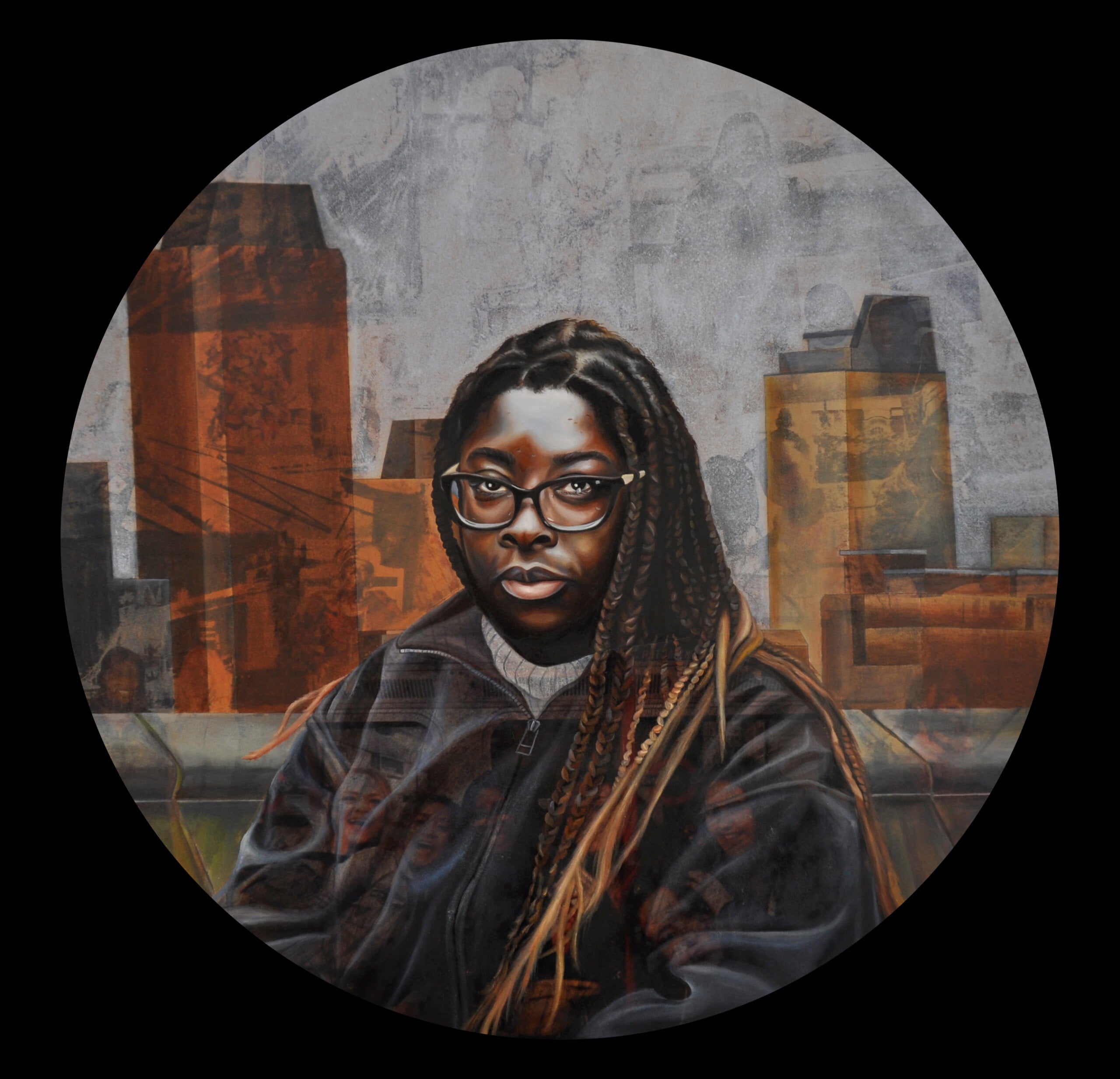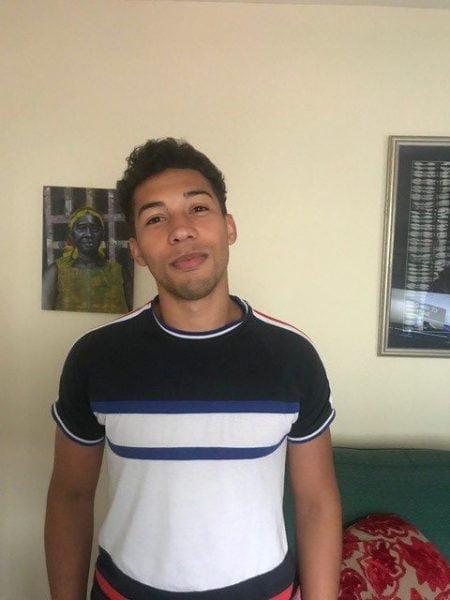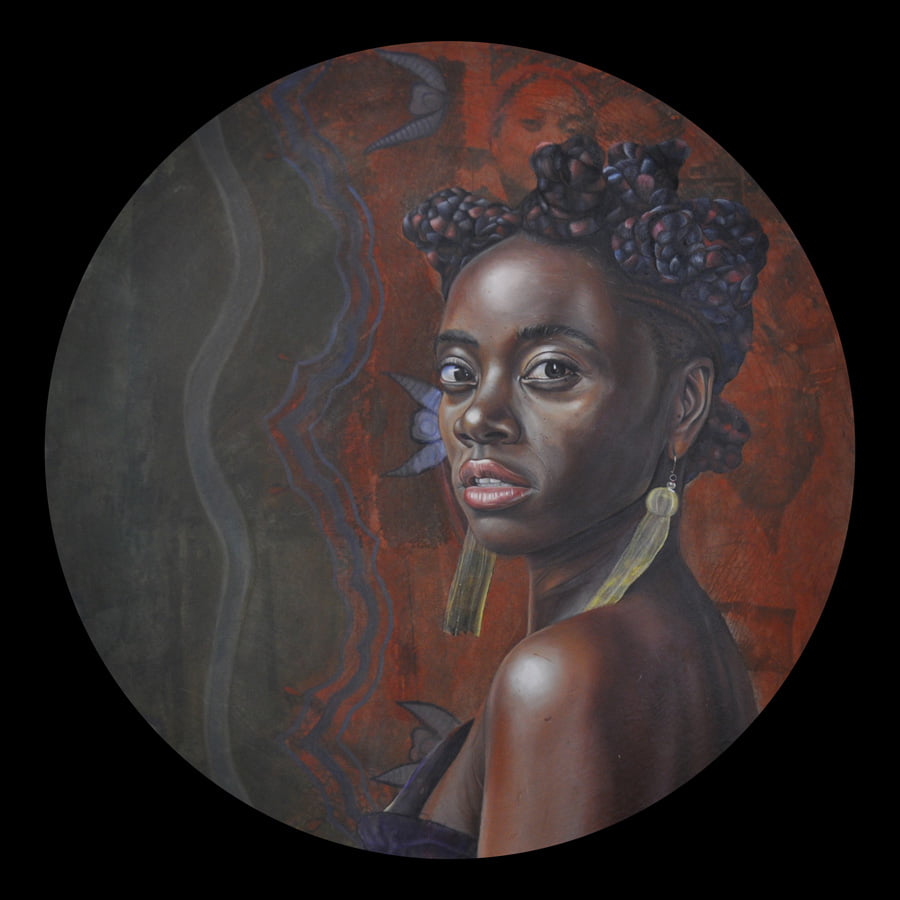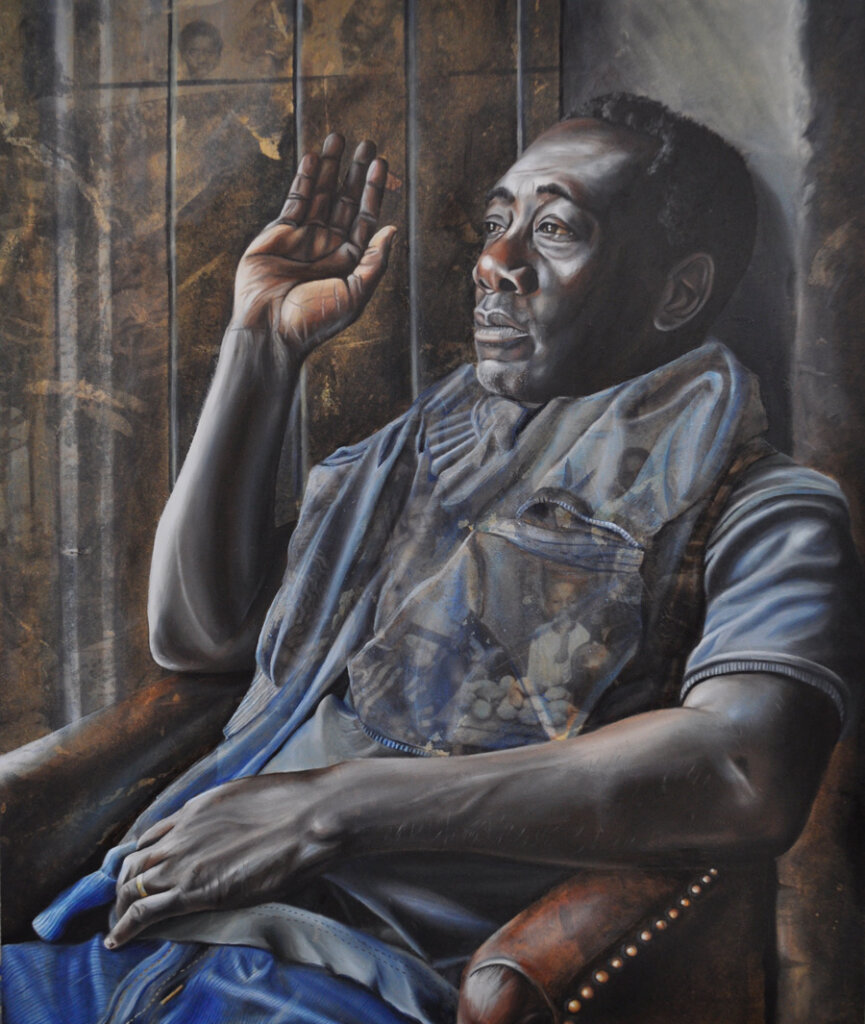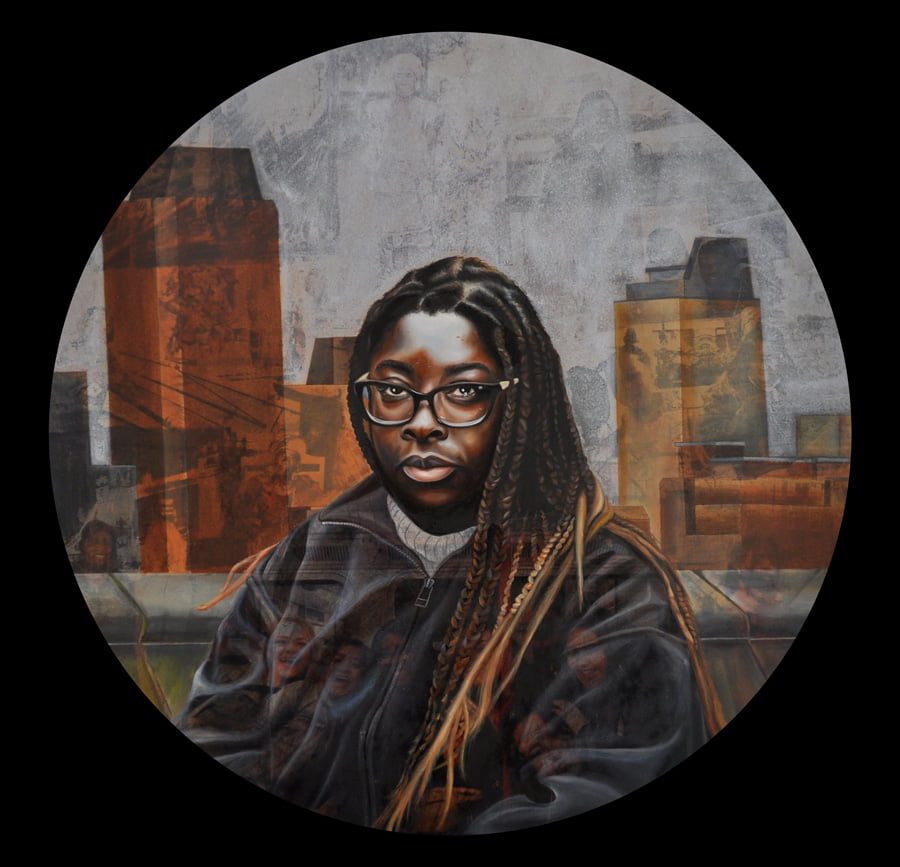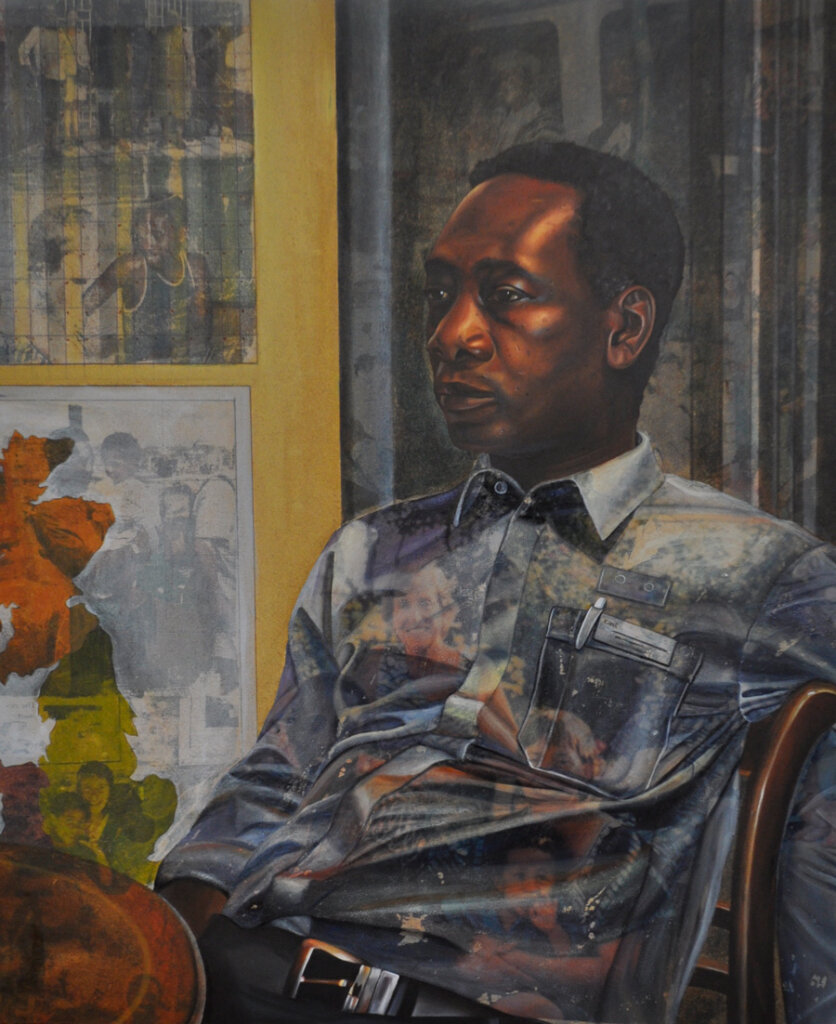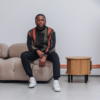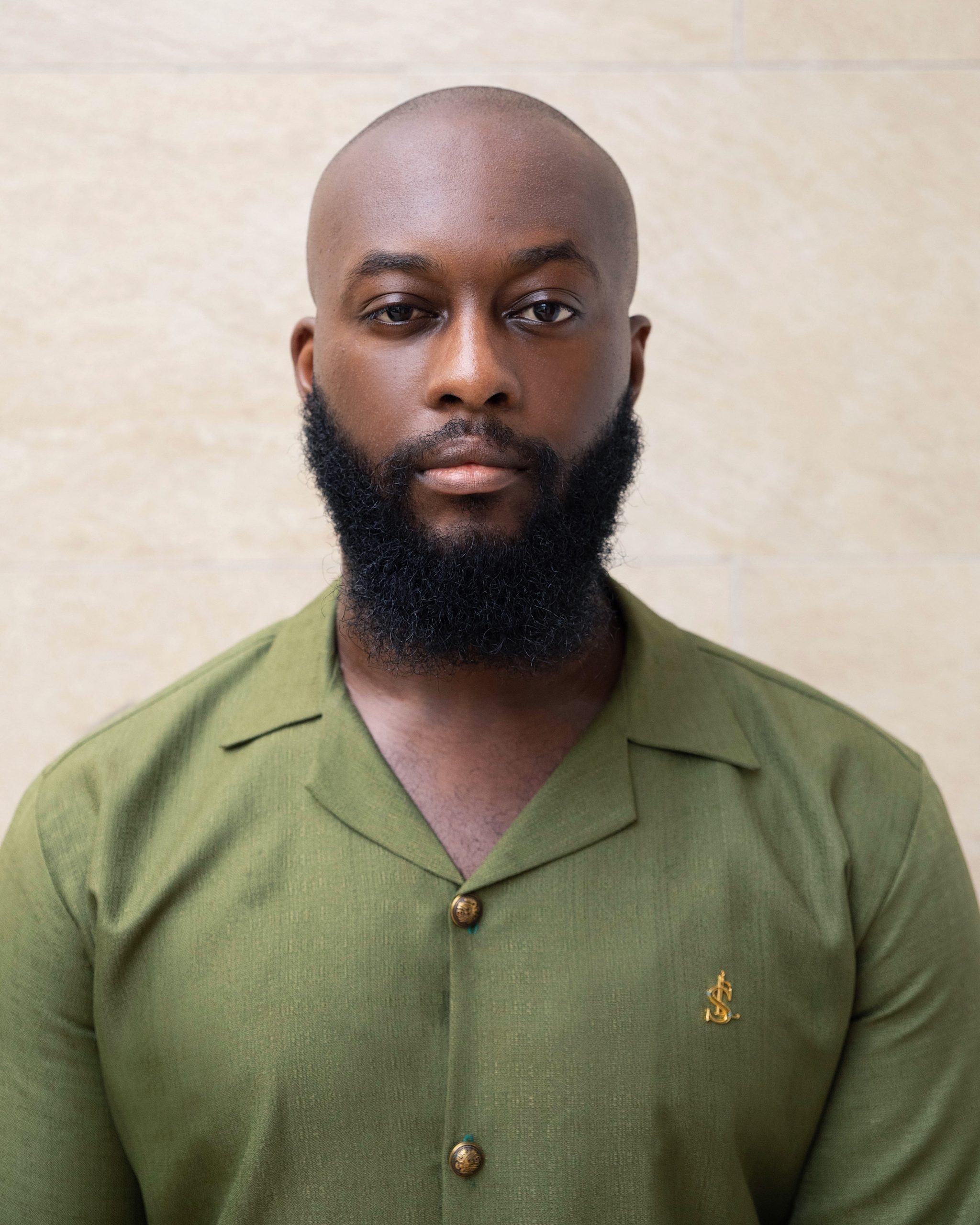Joshua Donkor is one of the most promising young British artists to emerge on the contemporary art scene. Since graduating from art school in 2020, the young artist has been tipped as an art graduate to closely watch, affirmed by his feature as one of Sky’s portrait artists of the year, and also becoming ‘The Next Big Thing’ portrait winner.
Raised in the UK of British and Ghanaian heritage, Joshua’s work explores the notion of identity, belonging and the complex narratives that surround these themes.
The Ancestral Foundations series really stemmed from some of W. E. B. Du Bois’s writing and my 3rd year project “Generational memories”. These influences got me thinking about the concept of identity and duality
Joshua Donkor
Raphael: This is a conversation I have been itching to have for a while now, especially after coming across your work at the ‘Awakening’ group exhibition curated by Chilli Art Projects, and being bowled over by your portraits. For the benefit of our readers who are yet to discover who you are, tell us a bit about yourself.
Q: When would you say your journey as an artist began in earnest, and how would you describe it so far?
Joshua: I only graduated from Cardiff School of Art and Design in 2020, so I’d say this has been my first year as an artist really. I was incredibly fortunate to receive The Artist Benevolent Fellowship after graduating. The Fellowship has offered me funding and support for this first year of my career. This gave me a stable platform to just keep on making and putting out work.
Raphael: One of your series of works that really caught my attention and impressed me was ‘Ancestral Foundations’ which I found incredibly intimate and personal, yet very familiar and relatable, given that we both share Ghanaian heritage, and have been raised in the UK.
Q: What was the inspiration behind this stunning series of work, and the process you underwent to capture your muses, and did you learn or uncover anything about yourself whilst creating these pieces?
Joshua: The Ancestral Foundations series really stemmed from some of W. E. B. Du Bois’s writing and my 3rd year project “Generational memories”. These influences got me thinking about the concept of identity and duality and how these themes impact other members of the African Diaspora. From there I began a series of conversations with friends, family and even some relative strangers about balancing different African cultures and heritage in their lives in the UK. These conversations would later inform each portrait in the series.
Raphael: Black History Month has recently passed, and there was an increased spotlight on emerging black British artists, especially those to keep an eye out for and follow closely. I know you have been hotly tipped as a British art graduate to watch, as well as being featured as a sky portrait artist in 2020.
Q. How do you feel about the growing awareness that black British artists are getting, and what more do you believe should be done to further push and promote the undiscovered talent that the UK art industry has failed to support, especially from underserved communities?
Joshua: In truth I’ve found the recent spotlight on black artists somewhat conflicting. A greater amount of opportunity for black artists is certainly something that is and has been needed and there has undoubtedly been a huge rise in the amount of artists finding opportunities and success recently.
Personally I feel that I have also benefited greatly from this, especially as an emerging artist. Although it feels very frustrating that it seems to require such traumatising events to trigger this. I think the most important thing is that this spotlight does not fade or become just another trend. These opportunities need to be maintained and normalized.
Raphael: You might recall that during the height of the pandemic, after the murder of George Floyd, there were increased calls to get rid of heritage and cultural monuments with ties to the transatlantic slave trade, as well as lively debates around decolonising the Government’s art collection.
Q: As an artist of dual West-African and British heritage, do you believe that the UK can ever reconcile its colonial past by investing in diversifying its arts and cultural landscape and embracing a multicultural modern society?
Joshua: I feel that the only way to ever really begin to achieve this is through acknowledgement of Britain’s Colonialist past and the damage it has caused. I think education is essential to this. I felt that the curriculum was sorely lacking in terms of these aspects of British history when I was at school and I know many of the people I have spoken with feel the same. However there are some really amazing organisations looking to fix this such as The Black Curriculum which I’d advise anyone who hasn’t heard of them to look into.
Raphael: Social media has in recent years played an important role in connecting artists with collectors, curators and gallerists. Even more so during the pandemic, it proved to be the saving grace of the global art market at large, with virtual shows going from being a novelty to the norm.
Q. What role has social media played in your journey as an artist, and your ability to connect with both a local and international market?
Joshua: Social Media has become a pretty crucial part of my practice, especially Instagram! It just enables a far greater level of global exposure for artwork. Beyond this it is also a great tool for connecting and collaborating with other artists as well which can only improve your practice. Certainly without social media I would not have come across many of the opportunities for competitions and exhibitions that I have been fortunate enough to be involved in.
Raphael: Now we know that contemporary African art has been on the rise in the last decade, and even more so in the last few years. I think it is irrefutable that this demand has been in part stimulated by artists of Ghanaian heritage who have especially been leading the charge.
Q: How do you feel about the rise of Ghanaian artists, and can we expect you to visit your fatherland anytime soon to further explore and develop your artistic practice and career, or perhaps even just to reconnect on a personal level with the land of your forebears?
Joshua: The rise of Ghanaian artists is incredibly exciting, I think that storytelling is pretty synonymous with Ghanaian culture so it’s probably no surprise that it produces so many artists!
I am actually going to be going back next year so will be hoping to connect with a few artists I have been in contact with out there. I am very blessed to have so much family out in Ghana, which has always made going back incredibly special. I am very keen to spend time living there in the future, maintaining my connection to Ghana is crucial to me.
Raphael: One of the elements of your work that really captured my imagination was your use of photo transfer images, which to me was reminiscent of the technique used by the iconic Njideka Akunyili Crosby.
Q: What inspired this choice of technique, and on the topic of inspiration and influences, which artists would you say have inspired your practice and journey to date?
A: Njideka Akunyili Crosby has been a huge source of inspiration for me! I first saw her work at the Venetian Biennale a few years ago when I spent a year studying at the Venetian painting Academy thanks to the Erasmus international study scheme. As soon as I saw her work I was totally transfixed. I began experimenting with different transfer techniques as a means of incorporating images from my family photo albums into my paintings. This afforded the work a far greater level of subtlety and acted as an appropriate metaphor for memory given the ghostly impression that acetone transfers can create.
I feel that I have been influenced by so many artists from completely different eras and for completely different reasons. If I were to name a few, I would say Georges de la Tour, Lynette Yiadom Boakye, Kehinde Wiley, Kerry James Marshall and Njideka Akunyili Crosby.
Raphael:
Q. What is next for you as an artist, and what can we expect in future, as far as a new series of work, or any group or solo exhibitions?
Joshua: I am just coming to the end of my Fellowship in Cardiff so will be looking to move into a new studio in Bristol from the start of next year.
I will be looking to continue expanding on and developing the work from the Ancestral Foundations series. I am particularly intrigued by the idea of contrasting individuals’ diasporic experiences who have grown up in other countries across Europe and especially America. I have just begun the interview stage for a few of these next portraits.
In terms of exhibitions, I currently have some pieces on show at The Oriel Davies Gallery in Wales and will hopefully be exhibiting a few pieces fairly soon in Cardiff and around London.
For now though the focus is very much on making new work!
Raphael: One of my greatest motivations as a historian, writer and a curator, but above all else, as an African, is to tell our stories. Before we go, tell us, what is your goal and purpose as an artist.
Q: What are you hoping to accomplish and achieve in this industry and your chosen profession?
Joshua: I feel exactly the same! I often describe my practice as visual storytelling because I feel that that is the purpose of my work. I hope for it to act as a means of sharing individual experiences, memories, histories and cultures. These are essential parts of all our lives and I hope that in sharing this we can all better understand and relate to one another.
https://www.instagram.com/joshuadonkorart/
©2021 Joshua Donkor


